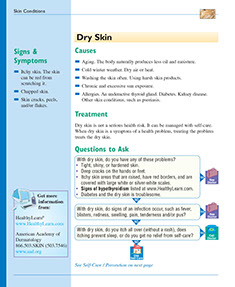Skin Conditions
Dry Skin
Signs & Symptoms
• Itchy skin. The skin can be red from scratching it.
• Chapped skin.
• Skin cracks, peels, and/or flakes.
Causes
• Aging. The body naturally produces less oil and moisture.
• Cold winter weather. Dry air or heat.
• Washing the skin often. Using harsh skin products.
• Chronic and excessive sun exposure.
• Allergies. An underactive thyroid gland. Diabetes. Kidney disease. Other skin conditions, such as psoriasis.
Treatment
Dry skin is not a serious health risk. It can be managed with self-care. When dry skin is a symptom of a health problem, treating the problem treats the dry skin.
Questions to Ask
Question
01
With dry skin, do you have any of these problems?
• Tight, shiny, or hardened skin.
• Deep cracks on the hands or feet.
• Itchy skin that are raised, have red borders, and are covered with large white or silver-white scales.
• Signs of hypothyroidism.
• Diabetes and the dry skin is troublesome.

You should be seen by your doctor for medical advice. Contact your doctor or health care provider to find out how soon you should be seen.
x
Question
02
With dry skin, do signs of an infection occur, such as fever, blisters, redness, swelling, pain, tenderness and/or pus?

You should be seen by your doctor for medical advice. Contact your doctor or health care provider to find out how soon you should be seen.
x
Question
03
With dry skin, do you itch all over (without a rash), does itching prevent sleep, or do you get no relief from self-care?

Call your doctor or health care provider and state the problem. He or she can decide what you should do.
x
Self-Care / Prevention
• Drink 8 or more glasses of water a day.
• Apply an oil- based lotion daily.
• Wear rubber gloves when you wash dishes.
• Take showers instead of baths. Use warm (not hot) water. Try sponge baths.
• Apply a moisturizing cream while your skin is damp. Use products with lanolin.
• If you do bathe, do so for only 15 to 20 minutes in lukewarm water. Pat yourself dry. Do not rub.
• Put soap on a washcloth, not right on the skin.
• Use a mild liquid soap, like Cetaphil lotion or use a fatted soap. Avoid deodorant, medicated, or alkaline soaps.
• Don’t use moisturizers with fragrances, preservatives, or alcohol.
• Use a night cream for the face.
• Stay out of the strong sun. Do not use tanning salons. When in the sun, use a sunblock with a sun protection factor (SPF) of at least 15.
• Don’t scratch or rub dry skin.
Resources

Download an offline pdf file.
RELATED ARTICLES
<
>
2021 © American Institute for Preventive Medicine - All Rights Reserved. Disclaimer | www.HealthyLife.com








